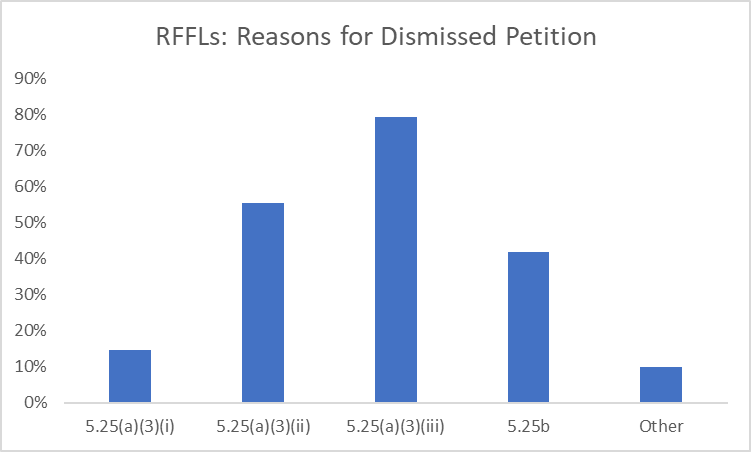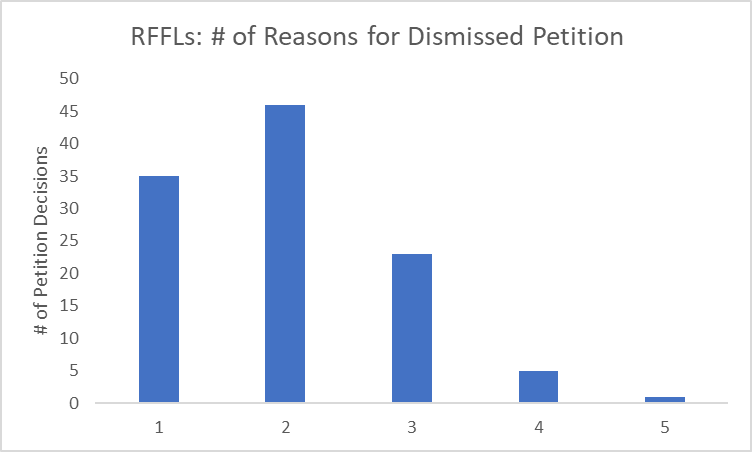“When crafting a RFFL petition, it is crucial to include a showing of facts rather than a mere allegation of action through error.”
 As outlined in our article, The Good, the Bad and the Missing: Findings from a Review of the Data on Granted Retroactive Foreign Filing Licenses, Petition.ai’s subscribers’ most searched patent petition type is for retroactive foreign filing licenses (RFFLs). In the article, we highlighted that 71% of applications petitioning the U.S. Patent and Trademark Office (USPTO) for a RFFL eventually are granted. On average, it took 2.3 RFFL petitions over 1.4 years before obtaining the granted petition. We also pointed out 84% of granted RFFL petition decisions could not be found in the Public PAIR’s Image File Wrapper (IFW). Several months after we published the article, and after several communications with the Office of Petitions, these granted decisions were finally published in the IFW. This article examines the most common reasons why the USPTO dismisses RFFL petitions.
As outlined in our article, The Good, the Bad and the Missing: Findings from a Review of the Data on Granted Retroactive Foreign Filing Licenses, Petition.ai’s subscribers’ most searched patent petition type is for retroactive foreign filing licenses (RFFLs). In the article, we highlighted that 71% of applications petitioning the U.S. Patent and Trademark Office (USPTO) for a RFFL eventually are granted. On average, it took 2.3 RFFL petitions over 1.4 years before obtaining the granted petition. We also pointed out 84% of granted RFFL petition decisions could not be found in the Public PAIR’s Image File Wrapper (IFW). Several months after we published the article, and after several communications with the Office of Petitions, these granted decisions were finally published in the IFW. This article examines the most common reasons why the USPTO dismisses RFFL petitions.
Restrictions on Exporting Technical Information
In the interests of national security, the United States government imposes restrictions on the export of technical information. As a result, permission from the Commissioner for Patents under 35 U.S.C. 184 is required before filing any application for a patent in a foreign country if the invention was made in the United States. There are two ways in which permission to file an application abroad may be obtained: (i) a petition for a foreign filing license may be granted or (ii) an applicant may wait six months after filing an application in the USPTO, at which time a license on that subject matter is no longer required, as long as no Secrecy Order has been imposed.
When Would You Need to File a Retroactive Foreign Filing License?
The penalties for failing to obtain any necessary license to file a patent application abroad include the loss of U.S. patenting rights in addition to a possible fine or imprisonment, as summarized in the June 12, 2019 IPWatchdog article entitled “Beware of Foreign Filing License Requirements.” A retroactive license may be sought if an unlicensed foreign filing has occurred through error. However, the requirements of 37 CFR 5.25 must be fulfilled in order for such a petition to be granted.
How Can You Obtain a Retroactive Foreign Filing License?
The criteria for a RFFL petition are set forth in 37 CFR 5.25 and MPEP Section 140.
(a) A petition for retroactive license under 35 U.S.C. 184 shall be presented in accordance with Section 13 or Section 5.14(a) and shall include:
(1) A listing of each of the foreign countries in which the unlicensed patent application material was filed;
(2) The dates on which the material was filed in each country;
(3) A verified statement (oath or declaration) containing:
i. An averment that the subject matter in question was not under a secrecy order at the time it was filed abroad, and that it is not currently under a secrecy order,
ii. A showing that the license has been diligently sought after discovery of the proscribed foreign filing, and
iii. An explanation of why the material was filed abroad through error without the required license under §11 first having been obtained; and
(4) . The required fee (17(g) of this chapter).
(b) The explanation in paragraph (a) of this section must include a showing of facts rather than a mere allegation of action through error. The showing of facts as to the nature of the error should include statements by those persons having personal knowledge of the acts regarding filing in a foreign country and should be accompanied by copies of any necessary supporting documents, such as letters of transmittal or instructions for filing. The acts which are alleged to constitute error should cover the period leading up to and including each of the proscribed foreign filings.
The USPTO provides additional information about petitions for a RFFL here.
Why are RFFL decisions dismissed?
We analyzed RFFL dismissals from 2021 and 2022 (through mid-October) to better understand why the Office of Petitions (OPET) dismissed the petitions. In total, the USPTO dismissed 110 RFFL petitions. These RFFL petitions were filed by 61 different law firms ranging from some of the largest patent prosecution firms to sole proprietors along with a large healthcare company and a national laboratory. Each decision was signed by one of three OPET employees, including a Petitions Examiner and two Attorney Advisors. Six additional OPET employees worked alongside the three Deciding Officials to craft 46% of the decisions.
According to our analysis, the most noted reason RFFL petitions were dismissed was due to 5.25(a)(3)(iii) – an explanation of why the material was filed abroad through error without the required license first having been obtained – not being fully satisfied, with 79% of the decisions citing this provision. In addition, 55% of the dismissed petitions cited 5.25(a)(3)(ii) – showing the license has been diligently sought after discovery of the proscribed foreign filing – as a ground for dismissal.
Table 1

On average, each decision cited two grounds for dismissal.
Table 2

Below is the reasoning behind a recent dismissed decision the USPTO deemed did not meet the requirements of 5.25(a)(3)(ii) and 5.25(a)(3)(iii). (Note, the underlined sentences were included in the decision):
With respect to requirement (3)(ii) of 37 C.F.R. § 5.25(a), petitioner has not shown that the license has been diligently sought after discovery of the proscribed foreign filing.
The [W] Verified Statement asserts that [T] discovered the proscribed foreign filing on November 3, 2021. The petition, however, is not accompanied by a Verified Statement from [T] describing the circumstances of the discovery of the proscribed foreign filing and the action(s) leading up to the instant petition being filed. Further, the [W] Verified Statement does not indicate when it was discovered that the proscribed foreign filing was filed without the required U.S. foreign filing license.
Any request for further consideration of this matter must include a Verified Statement from the relevant parties establishes when and by whom it became known that the proscribed foreign filing was made without the required U.S. foreign filing license. As it has not been made clear when the discovery was made, it cannot be found that the license has been diligently sought.
It further cannot be found that the retroactive foreign filing license has been diligently sought given that [BL] was seemingly aware that the listing of a non-Chinese citizen inventor would make the process of procuring the foreign patent more complicated.
Moreover, it cannot be found that the retroactive foreign filing license has been diligently sought given applicant did not consult U.S. counsel until March 16, 2021 despite being aware as early as February 25, 2021 that there was an issue concerning the foreign application having been filed prior to procuring a U.S. foreign filing license in view of the U.S.-based inventors. Any request for reconsideration of this matter should include Verified Statements from the relevant parties responsible for filing the proscribed foreign filing without the required U.S. foreign filing license. Such Verified Statements must address whether or not these individuals if and when these individuals became aware that the proscribed foreign filing was made without the required U.S. foreign filing license.
Any further request for reconsideration of this matter must establish that the upon discovery of the proscribed foreign filing having been made without the required U.S. foreign filing license, the petition for retroactive foreign filing license has been diligently sought.
With respect to requirement (3)(iii) of 37 C.F.R. § 5.25(a), the petition does not provide an adequate explanation of why the material was filed abroad through error without the required license under 37 C.F.R. § 5.11 first having been obtained. Further, the explanation set forth in the petition does not satisfy 37 C.F.R. § 5.25(b) which requires that the explanation “must include a showing of facts rather than a mere allegation of action through error.” The showing of facts as to the nature of the error should “… be accompanied by copies of any necessary supporting documents such as letters of transmittal or instructions for filing.” Additionally, 37 C.F.R. § 5.25(b) requires “statements by those persons having personal knowledge of the acts regarding filing in a foreign country.”
The petition and accompanying Verified Statement do not provide any explanation for why the proscribed foreign filing was filed without the required U.S. foreign filing license. Moreover, the petition and accompanying Verified Statement do not identify a specific error that led to the proscribed foreign filing being filed without the required U.S. foreign filing license or identify who was responsible for making the error.
The [W] Verified Statement merely asserts that [WD] filed the patent application material in China without having consulted corporate counsel, U.S. patent counsel, or the U.S. inventors. The petition is not accompanied by Verified Statements from [WD] or any officials from [ALAC].
Any request for further consideration of this matter must include a Verified Statement from the [ALAC] official(s) who authorized the filing of the proscribed foreign filing without the required U.S. foreign filing license having been first obtained.
The Verified Statement(s) from the [ALAC] official should explain why the material was filed abroad through error without the required license under 37 CFR 5.11 first having been obtained and should discuss their role in the error which led to the disclosure of this information via the foreign filing prior to securing a foreign filing license.
The Verified Statement(s) must indicate whether the signer was aware of the requirements of 35 U.S.C. 184 and 37 C.F.R. § 5.11(a) at the time of their involvement in the proscribed foreign filing and indicate whether the [ALAC] official who authorized the filing of the proscribed foreign filing did not have discussions with the corporate counsel, U.S. patent counsel, or the U.S. inventors prior to or after the filing of the proscribed foreign filing.
As set forth at 37 C.F.R. § 5.25(b), “[t]he showing of facts…should be accompanied by copies of any necessary supporting documents such as letters of transmittal or instructions for filing.” As indicated herein, the instant petition is not accompanied by any supporting documents of the facts alleged to had led to the proscribed foreign filing having been made without the required U.S. foreign filing license having first been obtained. Any request for reconsideration of this decision must be accompanied by copies of instructions regarding the filing, to the extent that instructions were reduced to writing.
In accordance with 37 C.F.R. § 5.25(b), “[t]he showing of facts as to the nature of the error should include statements by those persons having personal knowledge of the acts regarding filing in a foreign country.” Accordingly, a Verified Statement from an [ALAC] official(s) must be submitted setting forth the facts that led up to the filing of the proscribed foreign filing without the required U.S. foreign filing license having first been obtained. Additionally, a Verified Statement from the foreign counsel who filed the foreign application setting forth facts that led up to the filing of the proscribed foreign filing without the required U.S. foreign filing license having first been obtained.
Additional verified statements must address:
- What checks did petitioner’s foreign patent counsel follow when filing an application to ensure that a foreign application is not filed when a foreign filing license is required by 35 U.S.C. 184 and 37 C.F.R. § 5.11(a)?
- Was foreign counsel aware of U.S. foreign filing license requirements on or before filing the proscribed foreign filing?
- What checks did [ALAC] officials follow when filing an application to ensure that a foreign application is not filed when a foreign filing license is required by 35 U.S.C. 184 and 37 C.F.R. § 5.11(a)?
- If checks were in place, when were they instituted and why was the procedure not followed in this instance?
- Has foreign counsel working on behalf of [ALAC] previously filed or caused to have filed applications abroad where an inventive concept occurred in the United States or was this filing of the application at issue herein the first time?
Has [ALAC] previously filed application abroad where an inventive concept occurred in the United States or was this filing of the applications at issue herein the first time?
RFFL Petitions are Usually Granted Eventually, but Don’t Forget to Include the Facts
In conclusion, retroactive foreign filing licenses are eventually granted for 71% of the petitioned applications we reviewed. On average, it took 2.3 RFFL petitions over 1.4 years before obtaining the granted petition. The most noted reason RFFL petitions were dismissed was due to 5.25(a)(3)(iii) – an explanation of why the material was filed abroad through error without the required license under §11 first having been obtained – not being fully satisfied. In addition, the dismissed petitions also often cited 5.25(a)(3)(ii) – a showing that the license has been diligently sought after discovery of the proscribed foreign filing – as a reason it was dismissed.
When crafting a RFFL petition, it is crucial to include a showing of facts rather than a mere allegation of action through error. The showing of facts as to the nature of the error should include statements by those persons having personal knowledge of the acts regarding filing in a foreign country and should be accompanied by copies of any necessary supporting documents such as letters of transmittal or instructions for filing. The acts which are alleged to constitute error should cover the period leading up to and including each of the proscribed foreign filings.
By filing a clear and complete petition, applicants increase their chances of having it granted on the first attempt, thereby saving time and effort from filing subsequent renewed RFFL petitions along with six months of uncertainty and stress waiting for a decision to be mailed.

![[IPWatchdog Logo]](https://ipwatchdog.com/wp-content/themes/IPWatchdog%20-%202023/assets/images/temp/logo-small@2x.png)


![[Advertisement]](https://ipwatchdog.com/wp-content/uploads/2024/04/Patent-Litigation-Masters-2024-sidebar-early-bird-ends-Apr-21-last-chance-700x500-1.jpg)

![[Advertisement]](https://ipwatchdog.com/wp-content/uploads/2021/12/WEBINAR-336-x-280-px.png)
![[Advertisement]](https://ipwatchdog.com/wp-content/uploads/2021/12/2021-Patent-Practice-on-Demand-recorded-Feb-2021-336-x-280.jpg)
![[Advertisement]](https://ipwatchdog.com/wp-content/uploads/2021/12/Ad-4-The-Invent-Patent-System™.png)







Join the Discussion
No comments yet.